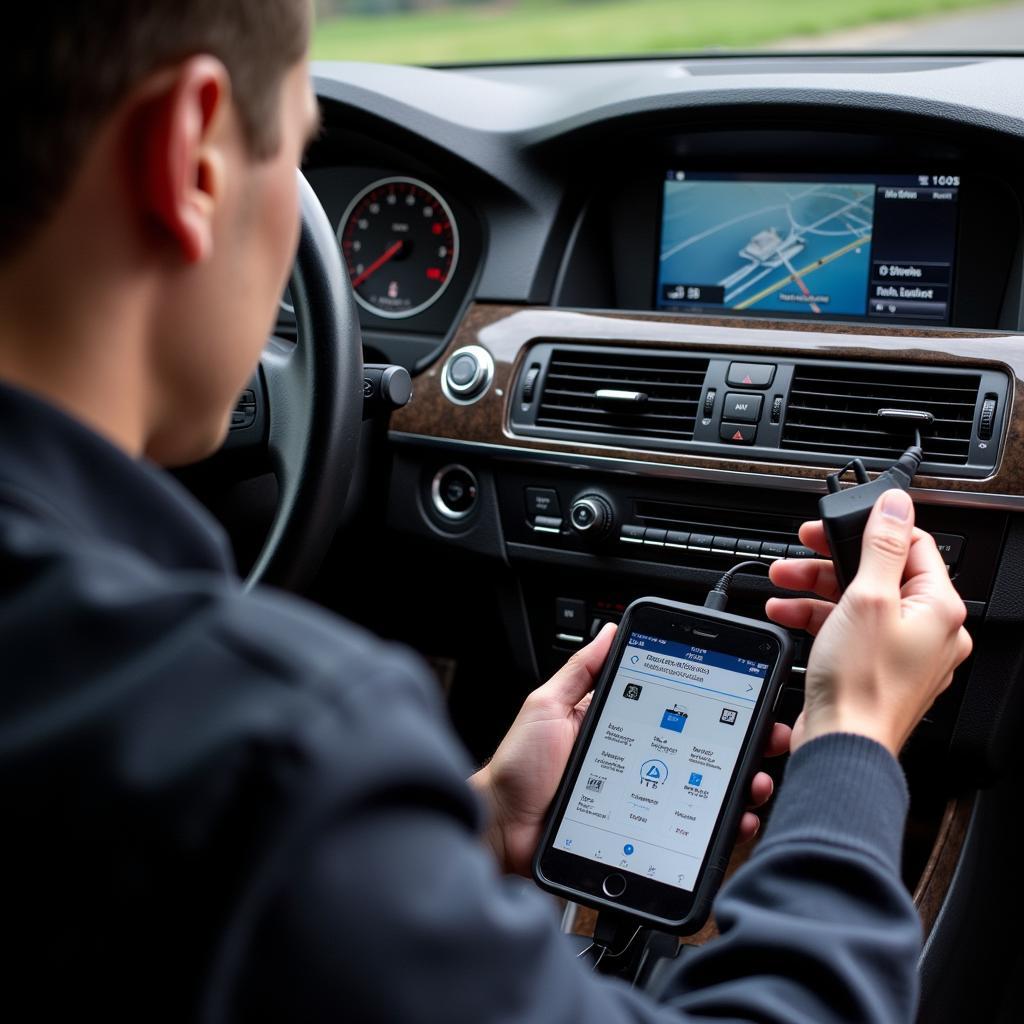When your BMW’s audio system starts acting up, it can be a real headache. From crackling speakers to a completely unresponsive head unit, these issues can quickly put a damper on your driving experience. While the prospect of dealing with complicated car electronics might seem daunting, understanding the potential causes and solutions can empower you to regain control over your BMW’s audio system. This guide will delve into common BMW audio head unit issues, explore troubleshooting steps, and shed light on the world of remote programming and installation.
Common BMW Audio Head Unit Issues
Before we jump into solutions, it’s helpful to understand the problems you might encounter. Here are some common issues with BMW audio head units:
- No Sound: This is often a sign of a problem with the amplifier, speakers, or wiring.
- Distorted Sound: Distortion usually indicates a problem with the speakers, amplifier, or audio source.
- Head Unit Won’t Turn On: This could be due to a blown fuse, a wiring issue, or a faulty head unit.
- Intermittent Problems: Intermittent problems are the most difficult to diagnose and can be caused by a variety of factors, including loose connections, faulty wiring, or a failing head unit.
- Bluetooth Connectivity Issues: In our digital age, seamless Bluetooth integration is crucial. Issues can stem from phone incompatibility, software glitches, or problems with the head unit’s Bluetooth module.
Troubleshooting Your BMW Audio System
Before you seek professional help, there are several things you can try yourself:
- Check the fuses. The fuses for your BMW’s audio system are located in the fuse box, which is usually located under the hood or in the glove compartment. Consult your owner’s manual to identify the correct fuses.
- Check the wiring. Inspect the wiring to the head unit and speakers for any loose connections or damage.
- Disconnect the battery. Disconnecting the battery for a few minutes can sometimes reset the head unit and resolve minor software glitches.
- Consult your owner’s manual. Your owner’s manual can provide valuable information about your specific audio system and may offer troubleshooting tips.
The Importance of BMW-Specific Diagnostic Tools
Modern BMWs are complex machines, and their audio systems are no exception. While basic troubleshooting can sometimes resolve issues, more complex problems require specialized diagnostic tools. These tools allow technicians to communicate with your BMW’s onboard computer system, read fault codes, and perform advanced diagnostics.
Remote Programming and Installation: The Future of Automotive Repair
Imagine this: your BMW’s audio head unit starts acting up, but you don’t have to drive to a repair shop. Instead, a qualified technician remotely accesses your vehicle’s computer system, diagnoses the problem, and installs the necessary software updates – all while you’re at home or work. This is the power of remote programming and installation.
Benefits of Remote Services:
- Convenience: No more taking time out of your day to visit a repair shop.
- Speed: Remote diagnostics and software updates can often be completed much faster than traditional methods.
- Expert Support: You gain access to specialized technicians with expertise in BMW audio systems.
How Remote Programming Works
The process relies on the vehicle’s OBD-II port, a standardized interface found in most modern cars. A specialized device connected to the OBD-II port allows secure communication with the vehicle’s computer systems. With the proper software and security protocols, technicians can perform a range of services, from diagnosing complex electrical issues to updating software modules.
Is Remote Programming Safe?
Security is paramount when it comes to remote vehicle access. Reputable remote programming services prioritize security by using encrypted connections, multi-factor authentication, and strict access controls.
When to Consider a New BMW Audio Head Unit
Sometimes, despite your best efforts and troubleshooting, a replacement head unit is the best course of action. This is especially true if your existing unit is outdated, damaged, or lacks the desired features.
Choosing the Right Head Unit:
- Compatibility: Ensure the new head unit is compatible with your BMW’s model year and existing wiring harness.
- Features: Consider your desired features, such as Bluetooth connectivity, navigation, smartphone integration (Apple CarPlay, Android Auto), and advanced audio settings.
- Professional Installation: While some head units are designed for DIY installation, it’s often best to have a professional handle the process, especially in modern BMWs with intricate electronics.
Expert Help is Just a Call Away
If you’re experiencing issues with your BMW’s audio system, don’t hesitate to seek professional assistance. At Cardiagtech, we specialize in BMW diagnostics, programming, and remote installation services. Our team of expert technicians can quickly and efficiently diagnose and resolve even the most complex audio system problems.
Contact CARDIAGTECH today at +1 (641) 206-8880 or CARDIAGTECH[email protected]. Our office is located at 276 Reock St, City of Orange, NJ 07050, United States
Frequently Asked Questions (FAQs)
1. Can I upgrade my BMW’s audio head unit myself?
While some head units are designed for DIY installation, it’s generally recommended to have a professional handle the installation in a BMW.
2. How much does it cost to replace a BMW audio head unit?
The cost of replacement varies depending on the model of your BMW and the features of the new head unit.
3. How long does it take to diagnose an audio system problem?
Diagnosis time can vary depending on the complexity of the issue.
4. What is involved in remote programming for a BMW audio system?
Remote programming involves a technician accessing your BMW’s computer system remotely to diagnose and resolve software-related issues.
5. What should I do if my new head unit doesn’t work properly?
If you experience problems after installation, it’s essential to contact the installer or the head unit manufacturer for assistance.

